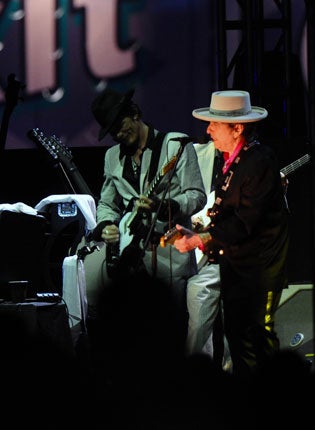After China, Bob Dylan plays Vietnam – but he's still not rocking the boat

Your support helps us to tell the story
From reproductive rights to climate change to Big Tech, The Independent is on the ground when the story is developing. Whether it's investigating the financials of Elon Musk's pro-Trump PAC or producing our latest documentary, 'The A Word', which shines a light on the American women fighting for reproductive rights, we know how important it is to parse out the facts from the messaging.
At such a critical moment in US history, we need reporters on the ground. Your donation allows us to keep sending journalists to speak to both sides of the story.
The Independent is trusted by Americans across the entire political spectrum. And unlike many other quality news outlets, we choose not to lock Americans out of our reporting and analysis with paywalls. We believe quality journalism should be available to everyone, paid for by those who can afford it.
Your support makes all the difference.After nearly five decades of singing about a war that continues to haunt a generation of Americans, the legendary performer Bob Dylan finally got his chance to see Vietnam at peace.
The American singer and songwriter, known for his anti-war anthems, gave a special concert yesterday in the former Saigon, nearly 36 years after the Vietnam War ended.
Dylan, 69, jammed on stage in a black jacket, purple shirt and white hat in the warm evening air, singing favourites such as "A Hard Rain's a-Gonna Fall" and "Highway 61 Revisited".
Only about half of the 8,000 seats at RMIT University were sold to a mix of Vietnamese and foreigners who danced on the grass as Dylan played guitar, harmonica and the keyboard. With more than 60 per cent of the country's 86 million people born after the war, many young people here are more familiar with contemporary pop stars such as Justin Bieber.
Still, Dylan's music during the tumultuous 1960s touched thousands of people in both nations. "Bob Dylan's music opened up a path where music was used as a weapon to oppose the war in Vietnam," said Tran Long An, 67, vice-president of the Vietnam Composers' Association.
Mr An was a student in Saigon, now called Ho Chi Minh City, during the war and took to the streets with other Communist sympathisers calling for the killing to stop. For some who were fighting in Vietnam's jungles, Dylan's music was a source of hope. "We listened to anything that spoke of peace. We called him the peace poet," said Stan Karber, 60, of Fort Smith, Arkansas, who served in Vietnam from 1969 to 1971 and has lived in Ho Chi Minh City for the past 15 years. "I'll be dancing here in a minute."
Dylan is one of the top foreign artists to perform in Vietnam, where big-name concerts are still rare and the Communist government maintains strict controls over expression. Dylan's song list was pre-approved by the government, but the promoter Rod Quinton, general manager of Ho Chi Minh City-based Saigon Sound System, said no restrictions were placed on the submitted list.
Dylan received criticism this week after his first-ever shows in China for allowing the Communist government there to vet his song list and for keeping quiet about the detention of activists. Two popular anti-war songs, "The Times They Are A-Changin'" and "Blowin' in the Wind", were not performed at the Beijing and Shanghai shows, but it was unclear if they were submitted for consideration.
Brad Adams, executive director of the New York-based watchdog Human Rights Watch's Asia division, said in the statement: "Dylan should be ashamed of himself. The young Dylan wouldn't have let a government tell him what to sing. He has a historic chance to communicate a message of freedom and hope, but instead he is allowing censors to choose his playlist."
Dylan's Vietnam songs
The 1963 album 'The Freewheelin' catapulted Bob Dylan into the heart of the movement against the Vietnam War with the protest songs 'Blowin' in the Wind' and 'Masters of War'. Though such songs did not directly reference the conflict, they captured the political upheaval of the time. In 1985, he released 'Clean-Cut Kid', one of his most blatant statements against the war. It tells the story of a young American drastically changed by his experiences in fighting in Vietnam: "They took a clean-cut kid and they made a killer out of him," Dylan sang.
Join our commenting forum
Join thought-provoking conversations, follow other Independent readers and see their replies
Comments